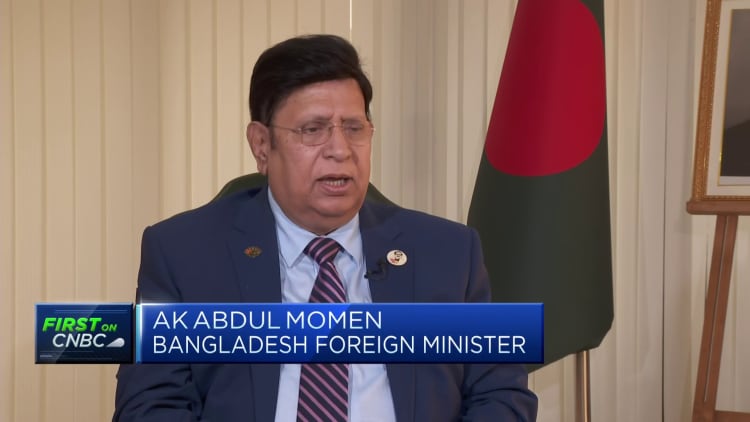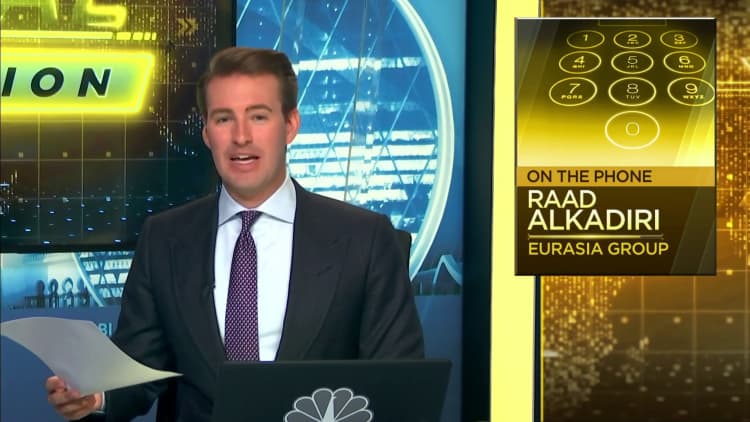[ad_1]

Bangladesh’s foreign minister said companies making “runaway profit” from the war in Ukraine should compensate affected, less developed nations.
“In this war, some companies are making runaway profit… energy companies and the defense companies,” AK Abdul Momen told CNBC’s Tanvir Gill on the sidelines of the G-20 foreign ministers summit in New Delhi.
“Therefore, we will argue that those companies that are making runaway profit, they should dedicate at least 20% of the profit to those countries that are most affected like us,” he added, without naming specific companies.
His comments come a little over a year after Russia’s invasion of Ukraine. The World Bank estimated Ukraine’s economy shrank by as much as 35% in the past year.
The war has also had major global economic ramifications, especially for countries like Bangladesh which imports most of its energy. The foreign minister said about 95% of the country’s energy is imported.
“Naturally, we buy energy from abroad. The cost of energy has shot up, resulting in high inflation. We are trying to control the inflation by providing subsidies and it is costing the government,” said Momen.
“Therefore, we want the end of the war. We believe in peaceful negotiations.”

The foreign minister further noted the G-20 countries should make this compensation “mandatory.”
“This is the G-20 leaders — they’re the leaders of the world … If I ask, they will not give a damn to it,” said Momen. “But G-20 leaders, they can make it mandatory for all those companies to pay a proportion of their runaway profit to the most affected countries.”
War fallout
Last year, a United Nations report highlighted the fallout from Ukraine’s war could dramatically worsen the economic outlook for developing countries already grappling with debt financing related to the Covid-19 pandemic.
“Rising commodity prices and trade disruptions are exacerbating inflationary pressures and dampened growth expectations are weighing on the recovery from Covid-19, with severe implications for some of the poorest and most vulnerable countries,” said the report.
“For many developing countries already at high risk of debt distress, the spillover effects of the war may further worsen debt vulnerabilities due to the increasing balance-of-payments and fiscal pressures,” the UN said.
In late January, Bangladesh secured $4.7 billion in loans from the International Monetary Fund to help cushion the blow of a looming financial crisis.

It will get $3.3 billion under the IMF’s extended credit facility and related arrangements, with an immediate disbursement of about $476 million. The IMF executive board also approved $1.4 billion under its newly created resilience and sustainability facility for climate investments for Bangladesh, making it the first Asian country to access it.
“Bangladesh’s robust economic recovery from the pandemic has been interrupted by Russia’s war in Ukraine, leading to a sharp widening of Bangladesh’s current account deficit, depreciation of the Taka and a decline in foreign exchange reserves,” the IMF said in a statement.
Food security
Bangladesh’s foreign minister also said food security is another problem the country is struggling with that the G-20 leaders need to tackle. He was also critical of the Western sanctions imposed on Russia, saying the measures are hurting the developing countries the most.
“We are really upset also because this war …. has broken the supply chain as well as financial transition mechanism. And these are hurting us, it’s hurting the poor developing countries a lot,” said Momen.
“Next time, when they come up with the sanctions and counter sanctions they should at least consult with people like us — the developing countries — to get some idea as how much it will hurt them. And should create a mechanism so that the countries that would be hurt- that they should be compensated with.”
[ad_2]
